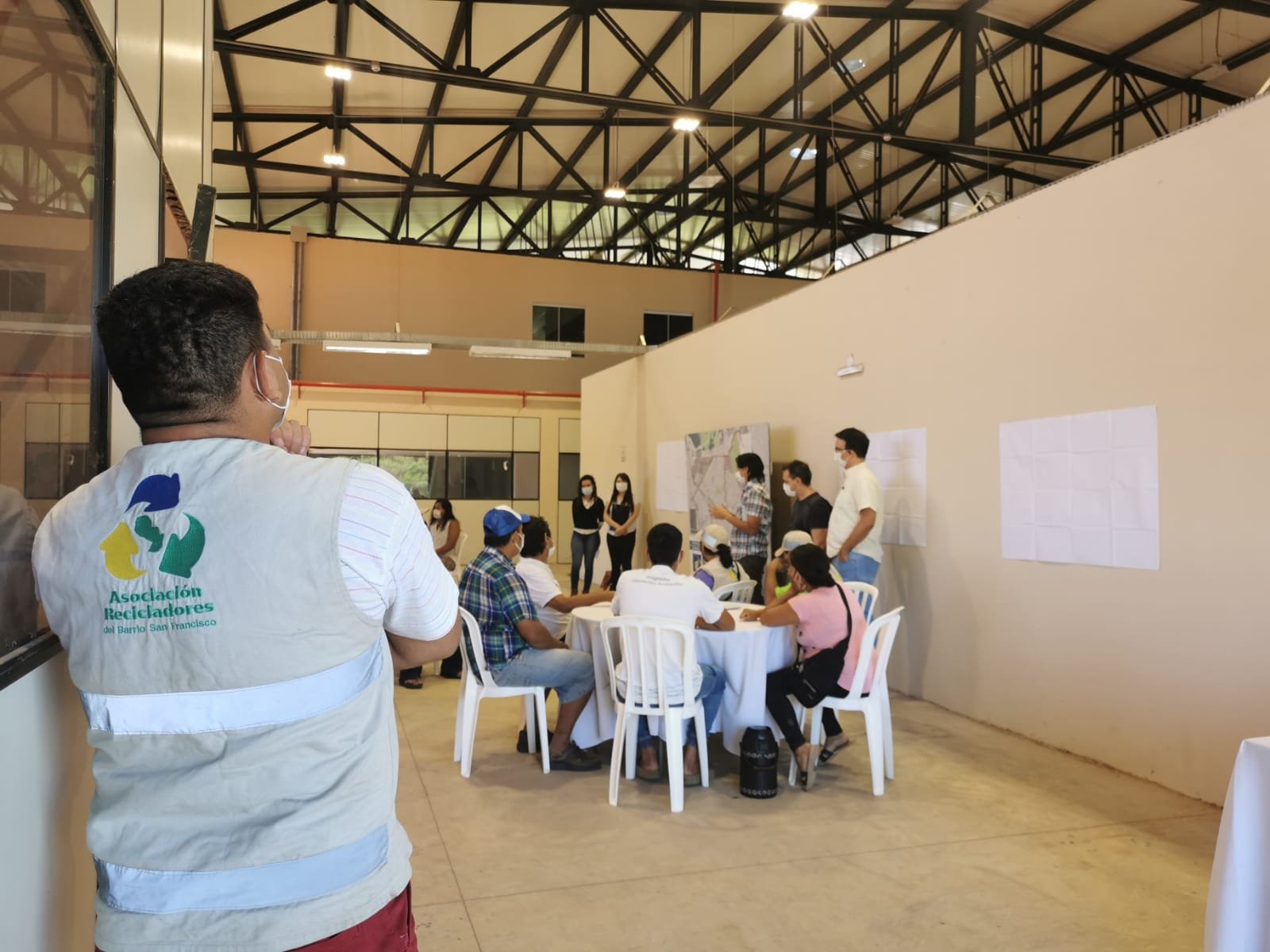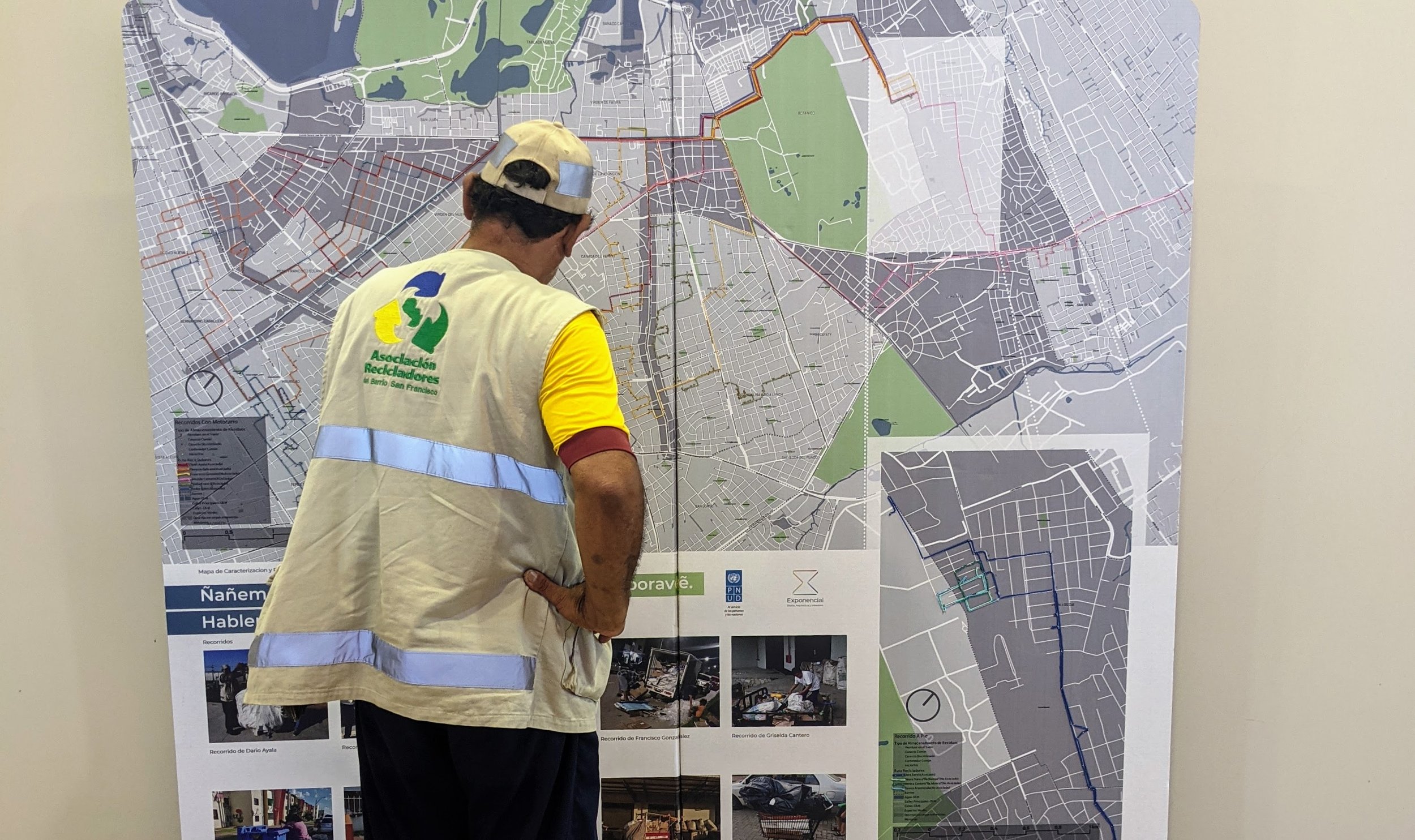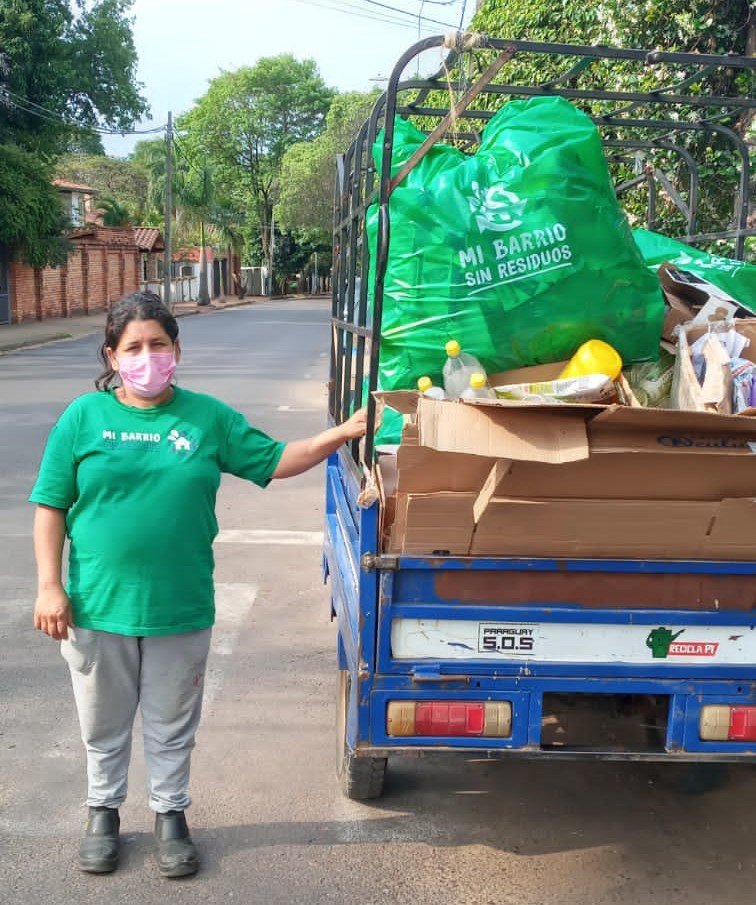Credit: This case study was kindly provided by the GEF and UNEP, as part of the GEF-6 programme.
My neighbourhoods without waste in Asunción, Paraguay
Sorting recyclable materials is a difficult task, if the right structure to collect them is lacking. In the city of Asunción, no segregated waste collection service is provided by the municipality. Recyclable materials are collected by urban recyclers, in poor working conditions and sold to businesses for their livelihoods. In order to recover recyclables materials and transform them into new products at a larger scale, an initiative was launched by Mi Barrio Sin Residuos, with the help of the San Francisco Neighbourhood Recyclers Association. This initiative brought together national and international public and private partners, as well as neighbours and urban recyclers. In 6 months, more than 150 homes participated in the project, and more than 7 tonnes of waste were recovered and recycled. Urban recyclers have seen their working habits optimized and their daily earning increased by 20%. Already, a new phase of Mi Barrio Sin Residuos has been launched to deepen the work already started.
KEY ACTORS AND PARTNERS
Mi Barrio Sin Residuos (My Neighbourhood Without Waste, in English), in its first stage, was an initiative that promoted recycling in Asunción, through a platform that connected households from 5 neighbourhoods with a collective of urban recyclers, the San Francisco Neighbourhood Recyclers Association, who offered their services to collect recyclable materials.
This innovative proposal aimed to bring about a more circular city, through a multisectoral alliance that included Coca Cola Paraguay, the Municipality of Asunción, The Ministry of Environment and Sustainable Development (MADES), and UNDP, all together within the framework of the Asunción Green City of the Americas - Pathways to Sustainability project.
Project & Process overview
Within the framework of the Asunción Green City project, a series of actions had already been under way, focused on strengthening and building capacity for the San Francisco Recyclers Association. This experience was the basis for an innovative collaboration with the UNDP Accelerator Lab.
On one hand, residents from 5 neighbourhoods that had been previously selected had a two-month period to sign up for the segregated collection service through asimple digital platform. Eligible households then participated in a series of online workshops to learn the correct methods to sort their waste at home. Once the collection service started, the participants would hand their recyclables to members of the San Francisco Recyclers Association, during their weekly visits to each home. In the first stage of the programme, the segregated collection service was coordinated by the social company Soluciones Ecológicas, in collaboration with the San Francisco association, and with the support of Fundación Moisés Bertoni.
Neighbors and recyclers. Source: Gentileza
Plastics, cardboard, paper, aluminium, metals and tetrapak, are within the list of materials collected and sorted by the members of the association at their recycling workshop in the San Francisco neighbourhood. They later sell these materials to local recycling companies, closing the loop and allowing these to be transformed into new products.
« I signed up for Mi Barrio Sin Residuos because I noticed that very few people are doing something to take care of the environment. I thought it was an innovative initiative that motivates people to recycle and care for our city »
On the other hand, the workflow of the urban recyclers has also been enhanced. From personal interviews to participatory workshops, the members of the association tried to learn about the daily life of an urban recycler. This process resulted in a detailed mapping of their daily routes and collection points and helped determine the challenges they face each day.




This information was the starting point to determine the area where the first pilot of Mi Barrio Sin Residuos should focus, in order to optimize recycling and enhance the work already done by the association. Logistical challenges were also addressed, in order to facilitate the collection process. An industrial scale was installed in the association's recycling workshop, allowing them to establish a baseline to measure the impact of the initiative.
results
More than 150 homes signed up to participate in the initiative in its first few months, providing enough recyclables to fill all 5 of the Associations’ motorcars every week. In six months of operation, over 7,310 kg of recyclable materials have been recovered, resulting in an increase of approximately 20% of the recyclers' daily earnings.
Griselda Cantero, president of the San Francisco Neighborhood Recyclers Association. Photo credit: Soluciones Ecológicas.
To capitalize on all the lessons learned, the UNDP Accelerator Lab carried out an experimental impact evaluation of the initiative, with both participants and recyclers, to better assess their needs going forward and discover which areas can be improved.
The impact evaluation shows that this initiative has the potential to change recycling habits, improve the working conditions of urban recyclers, and increase the recovery of recyclable materials. Promoters have already scaled-up the initiative, launching the new phase of Mi Barrio Sin Residuos, which aims to recover 3.200 tons of recyclable materials this year.
Employee sorting waste. Source: UNDP
LESSONS LEARNT
The project is a great example of an integrated approach to sustainable neighbourhood design. It proposes a way to improve circularity at neighbourhood scale, while improving communities' engagement and developing economic opportunities for local recyclers. The local recyclable materials collected are re-introduced into the production chains of new goods. In addition, by creating better working conditions and higher wages for urban recyclers, this project enhances their engagement, and creates a sense of belonging to the community.
Mi Barrio Sin Residuos leaves us with a clear lesson: when citizens are given the opportunity to contribute to making recycling possible, they will seize it.
For more information on the project, please read about this project on the UNDP website, and visit GEF website.




